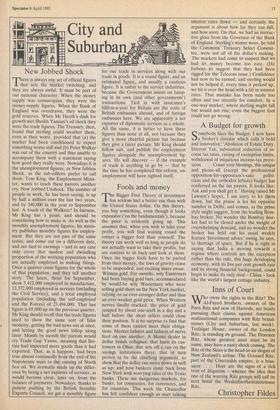Fools and money
The Bigger Fool Theory of investment has seldom had a better run than with the United States dollar. On this theory, you buy something, even though it looks expensive ('on the fundamentals'), because the price is evidently going up. This assumes that, when you wish to take your profit, you will find waiting round the corner a bigger fool than yourself. The theory can work well so long as people do not actually want to take their profits, but are content to sit back and look at them. Once the bigger fools have to be parted from their money, the laws of gravity cease to be suspended, and exciting times ensue. Witness gold. For months, wily Easterners had been buying gold bars, accommodated by would-be wily Westerners who were selling gold short on the New York market, relying on an ever-stronger dollar and thus an ever-weaker gold price. When Western nerves finally cracked, the price of gold jumped by about one-sixth in a day and a half before the short sellers could close their position. It is no surprise to find that some of them cannot meet their obliga- tions. Market failures and failures of nerve feed on one another. A Miami dealer in dollar bonds collapses: that hurts its cus- tomers in Ohio: that sets off a run on the savings institutions there: that in turn proves to be the clinching argument, to show that the dollar can move down as well as up; and now bankers come back from New York with worrying tales of the Texas banks. These are dangerous markets, for banks, for companies, for currencies, and for countries. This week the Chancellor has felt confident enough to start talking interest rates down — and certainly the argument is about how far they can fall, and how soon. On that, we had an instruc- tive gloss from the Governor of the Bank of England. Sterling's winter woes, he told the Commons' Treasury Select Commit- tee, were not all of the dollar's making. The markets had come to suspect that we had let money become too easy. (He forbore to suggest that they had been rigged for the Telecom issue.) Confidence had now to be earned, and sterling would not be helped if, every time it perked up, we hit it over the head with a lift in interest rates. That mistake has been made too often and too recently for comfort. In a one-way market, where sterling might fall but would not rise, even the biggest fool could not go wrong.










































 Previous page
Previous page